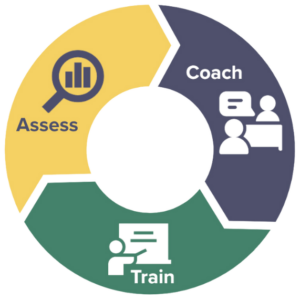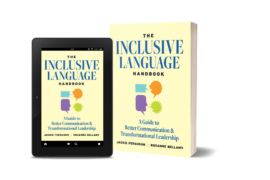Sales success depends on relationships, and one of the best ways to build rapport with potential customers is to treat everyone with respect, empathy, and understanding.
But what if members of your sales team are inadvertently sabotaging their own success with one wrong word or action? Their genuine efforts to connect on a personal level will fall flat and seem insincere.
A robust and effective diversity, equity, and inclusion (DEI) training program can help your team build strong relationships, but even small actions can make a big difference. DEI expertise can improve the competency of your team because it will enhance their ability to communicate with all clients. And since implementing inclusive practices will increase your sales team’s success, it will also boost the profitability of your business.
In fact, research shows that DEI practices drive tangible results for sales organizations. According to a LinkedIn/Forrester study, sales teams that employ these practices experience 28% higher conversion rates, 12% higher sales attainment, and 6% higher customer satisfaction.
While the benefits of a DEI training program are clear, changing long-standing attitudes and ingrained habits won’t be a quick process. The most important things are to realize that a DEI strategy will improve your business and to begin your efforts today. Even small steps toward greater inclusion will reap huge benefits. Here are six practical ways to roll out a DEI training program that will empower your sales team.
Make sure everyone understands the benefits of DEI
Perhaps the best place to start is with the question, “What’s in it for me?” Without buy-in from your sales team, your efforts to launch a DEI training program will go nowhere. But once everyone understands that they will benefit personally, it’s a much smoother process.
The answer is simple. An effective DEI training program will give your sales team the tools they need to connect with prospective clients and understand their needs and wants. Mutually-beneficial relationships with clients means more sales, more satisfied customers, and greater profits for your business. Higher profits mean higher pay, better benefits, and other employee incentives.
DEI training also improves relationships within the company, including employee satisfaction and retention. Keeping great salespeople, administrators, and support staff means a higher level of performance and greater organizational efficiency. Plus, all this excellence leads to a better reputation in the community, which makes sales easier to land.
Support from the management team is also vital when launching a DEI training program. Fortunately, the business case for DEI training is well-established, and the outcomes of this training can easily be tied to a company’s values and mission. For example, if innovation is part of a company’s culture, one could point out that diverse companies are 70% more likely to capture new market share. Or if teamwork is a company value, one could highlight that DEI increases empathy in the workplace and employees are more willing to work together.
Next, take a look at your team
An assessment of your resources, especially the composition of your sales team, should be one of the first things you tackle when rolling out a DEI training program.
A diverse sales team is optimal because they can make more meaningful connections with your increasingly diverse customer base. Diverse sales team members will also bring different experiences to the table, to learn from one another and to help you understand how to reach buyers in a crowded marketplace.
What can you do if you are leading a sales team that seems fairly homogeneous?
Remember that diversity can take many forms, including age, religion, and sexual orientation as well as personality types, learning styles, and motivations. By getting to know each other, your team members can begin the DEI learning process in a safe, friendly way, just by sharing stories about themselves – even if their diverse identities aren’t readily apparent.
Regardless of the makeup of your sales team, DEI training is helpful for everyone. In particular, sales staff can learn practical strategies for client interactions through DEI training that includes actionable guidance on unconscious bias and inclusive language.
Words matter, especially with multicultural audiences
One ill-chosen phrase can derail a conversation, or at best, distract from what is being said. Even common sports analogies like calling a victory a “home run” or a “touchdown” can confuse listeners who aren’t familiar with baseball or American football. Sometimes, an outdated expression can even be offensive, and the person speaking won’t realize their mistake.
“Their lack of awareness doesn’t mean they’re a bad person or that the product or service they are selling isn’t worthwhile, but it does need to be corrected,” writes Shelley Willingham, Vice President of Business Strategy at The Diversity Movement.
“The use of terms or phrases that are perceived to be offensive can cost your business substantial revenue – and often, they won’t even know why.”
Inclusive language is all about honoring people’s identities and experiences – making your listeners more comfortable. DEI training can help your team polish their inclusive language and banish common, but offensive, phrases. To learn more about inclusive language best practices, download our white paper, “Say This, Not That.”
Unconscious bias can sabotage sales
Unconscious biases, also known as implicit biases, are assumptions, beliefs, or attitudes about certain groups of people that individuals have but aren’t aware of. These snap judgements can even run counter to a person’s stated values.
“A lack of awareness does not make this kind of bias any less pernicious, as the victims of the bias are likely to pick up on it and are likely to resent the unfair treatment they receive as a result of those biases,” according to Willingham.
Needless to say, those on the receiving end of unconscious bias won’t be eager to do business with salespeople who aren’t treating them well, even if that treatment is unintentional.
Everyone has unconscious biases. They’re a natural part of human cognitive functioning, and they are nearly impossible to get rid of. However, DEI training can help your sales team manage and mitigate their biases, change their behavior, and track their progress. It’s also important to note that there are no quick fixes; fighting implicit bias is a long-term process. For more information, check out our course on unconscious bias.
DEI training should be voluntary
Research has shown that mandatory training increases feelings of resistance among participants, and can actually increase bias. While there are clear advantages to DEI training for your sales team, to be effective, any diversity education programs should be voluntary. Along with providing educational materials (like “Diversity: Beyond the Checkbox Essentials”), participating employees should be paid for the time it takes to complete their learning. DEI training should never be something extra, one more task for employees to accomplish.
Knowing the business benefits and seeing the support of the leadership team are powerful motivators. Plus, once your salespeople understand that DEI training will give them a competitive advantage, your team members will often be eager to participate.
Finally, follow up and see where you are
Also, consider conducting a sales report every few months from the moment you start your DEI training to see how much your sales have increased and customer satisfaction has improved. Consistent data collection and analysis will give you a tactical, metric-based understanding of return-on-investment (ROI) and will help you understand the best way to keep moving forward.
This information will also help convince late adopters of the tangible benefits of a DEI training program.
Remember, helping your sales team integrate inclusive principles into their outreach efforts will boost their success and your company’s profitability. Ensure your team is better equipped to connect positively with all customers by launching a DEI training program today.
Amber Keister is a Content Writer and Editor at The Diversity Movement. She has spent more than 20 years as a journalist for publications throughout the South. Connect with her on Linkedin.














